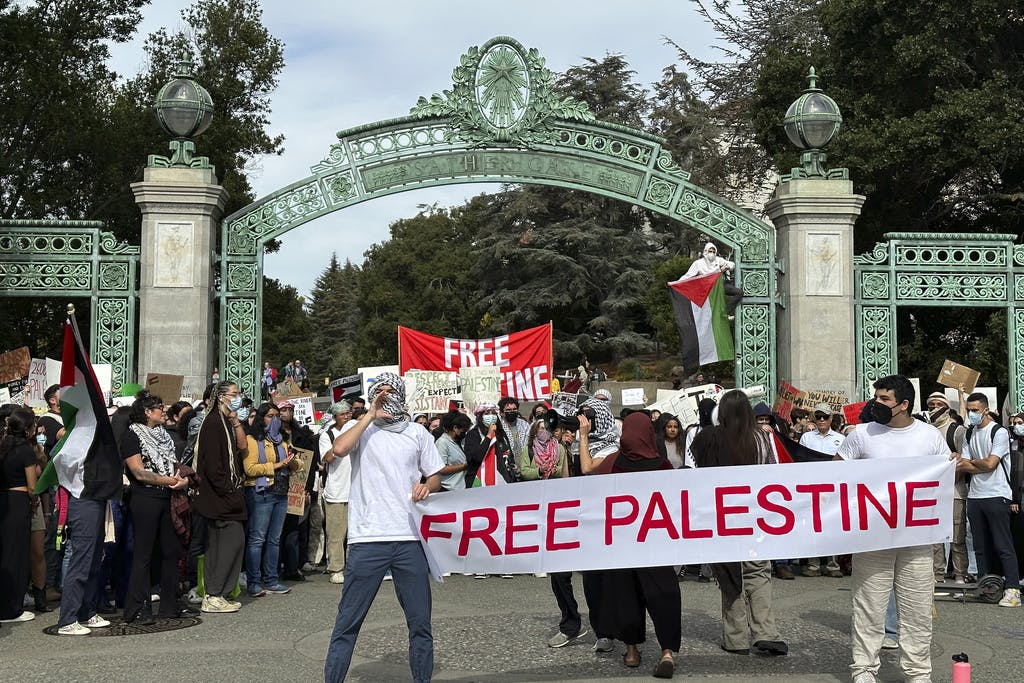Berkeley Debates Free Speech Limits After Pro-Palestinian Students Disrupt Dinner at Professor’s Home
An anti-Israel student and her supporters are insisting that she has a First Amendment right to disrupt the private dinner at a professor’s home.

A debate about free speech and protest is erupting at the University of California, Berkeley after pro-Palestinian protestors disrupted a dinner at the home of the Jewish dean of Berkeley Law School, Erwin Chemerinsky.
Jewish Insider’s Josh Kraushaar reports that the the president of the University of California system, Michael Drake, said of the incident that “These actions were antisemitic, threatening, and do not reflect the values of this university.”
“The individuals that targeted this event did so simply because it was hosted by a dean who is Jewish,” Mr. Drake said.
On Tuesday, Mr. Chemerinsky hosted a dinner for about 60 graduating law school students at his home. During the dinner, a Palestinian American law student, Malak Afaneh, stood up and began to give a speech about Ramadan.
“Tonight we are gathered here in the name of commemorating our final few weeks as law students,” Ms. Afaneh said. “Tonight is also the last night of the holy month of Ramadan where millions of Muslims around the world fast.”
A video of the event shows Mr. Chemerinsky and his wife, professor Catherine Fisk, interrupting her diatribe, with Mr. Chemerinsky saying, “Please leave our house.”
The video shows Ms. Fisk putting her arm around Ms. Afaneh, who is dressed in a white “divest” shirt, a red hijab, and a black-and-white keffiyeh, and asking her to leave. “Please leave our house,” Mr. Chemerinsky says, “you are guests at our house.”
Ms. Afaneh, who was repeatedly asked to leave by the hosts but refused to do so, then says, “We have attorneys,” adding “the National Lawyers guild has informed us that this is our First Amendment right and they are aware of this, they are not wrong.”
Ms. Fisk then says, “This is my house” and says she will call the police. Ms. Afaneh responds “okay you can call the police,” after which Ms. Fisk grabs the microphone and the two struggle for the microphone again.
Ms. Fisk says, “You were not invited for this purpose.” Ms. Afaneh responds, “We are talking about Ramadan and the holy month of Ramadan as Muslim students. We refuse to break our fast on the blood of Palestinian people.”
At this point in the video, multiple people are speaking over one another and Mr. Chemerinksy says, “It is incredibly rude of you to abuse our hospitality in this way.”
Ms. Afaneh and her supporters are insisting that she had a First Amendment right to disrupt the dinner, even though it was held on private property.
In a statement about the incident, Mr. Chemerinsky says that members of the student government had told him that protesters would disrupt the dinner if he did not cancel it. He says a poster circulating on campus before his dinner featured “a caricature of me holding a bloody knife and fork, with the words in large letters, ‘No dinner with Zionist Chem while Gaza starves.’”
“I never thought I would see such blatant antisemitism, with an image that invokes the horrible antisemitic trope of blood libel and that attacks me for no apparent reason other than I am Jewish,” Mr. Chemerinsky said in the statement.
A statement about the incident from an anti-Israel student group, Berkeley Law for Palestine, accuses Ms. Fisk of “assaulting” Ms. Afaneh. It is, the group says, only “the latest attack on Palestinian, Muslim, and Pro-Palestinian students.”
The incident is the latest to ignite debate over free speech and protest at Berkeley. In the fall, Mr. Chemerinsky and student groups clashed over a proposed bylaw that would prevent the school from inviting “speakers that have expressed and continued to hold views or host/sponsor/promote events in support of Zionism, the apartheid state of Israel, and the occupation of Palestine.”
Mr. Chemerinsky opposed the bylaw, writing in a letter “It is troubling to broadly exclude a particular viewpoint from being expressed. Indeed, taken literally, this would mean that I could not be invited to speak because I support the existence of Israel.”
Mr. Chemerinsky also defended a professor for the publication of an opinion piece in the Wall Street Journal titled “Don’t Hire My Anti-Semitic Law Students,” saying it was free speech even if people find it “deeply offensive.”
